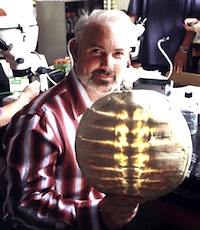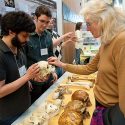Noted biologist to give free, public talks in Madison
Scott Gilbert, a professor of biology at Swarthmore College noted for using stories, images and analogies to get scientific points across, will give two free public lectures in Madison Dec. 12 and 13.

Gilbert
“Scott Gilbert has this amazing ability to talk at multiple levels at once,” says Lynn Nyhart, professor of the history of science at the University of Wisconsin–Madison. “He uses sophisticated biological language, but every time he nears the limit of understanding, he makes an analogy to everyday life. He’s able to give two talks at once, and so he gets questions from middle school children and retired scientists alike.”
In a discussion of symbiosis Dec. 12, Gilbert will re-evaluate the traditional view of animals as “individuals.” He notes that our cells are vastly outnumbered by the essential microbes living in our gut, and asks whether we are as reliant on symbiosis as the lichen, the familiar collaboration between fungi and algae?
In a talk on turtle evolution Dec. 13, Gilbert will explore general themes of evolutionary biology. “When he asks how the turtle got its shell, how could you not be interested in that?” Nyhart says. “He uses that opening to explore complicated scientific questions that draw on the deepest roots of evolution. He is really engaging, and this comes from his ability to use good stories, images and analogies.”
“He uses sophisticated biological language, but every time he nears the limit of understanding, he makes an analogy to everyday life.”
Lynn Nyhart
The Dec. 12 talk, “We are All Lichens: Symbiosis and the Restructuring of Individuality,” will be at 7 p.m. at Wednesday Nite @ the Lab in room 1111 of the Genetics-Biotechnology Center Building, 425 Henry Mall on the UW–Madison campus.
Gilbert’s Dec. 13 presentation, “How the Turtle Got Its Shell,” will be at 6:30 p.m. as part of the Discovery! Thursdays at Madison Public Libraries series, at the Lakeview Branch, 2845 N. Sherman Ave., Madison.
Gilbert’s visit is sponsored by the Anonymous Fund, the Wisconsin Institutes for Discovery, and the Robert F. and Jean E. Holtz Center for Science and Technology Studies.
Tags: biosciences, events


